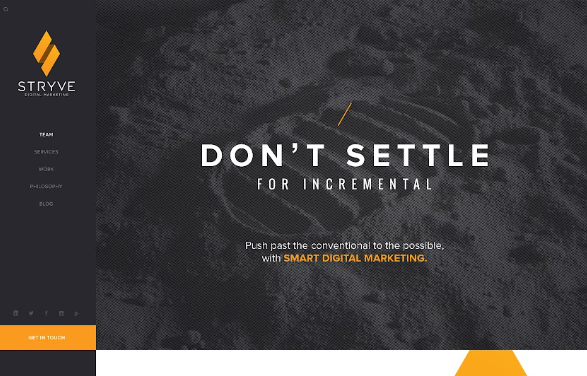Team Talk: I fucked up at work—now, what? How reframing mistakes helps you grow
By: Sara Kohan
November 27, 2024 | Reading Time: 7 mins
Let’s talk about the dreaded F-word that strikes fear into the minds of fearful perfectionists (AKA every Stryver) during every project or pitch. No, not that F-word. Today, we’re talking about failure, a word few professionals want to advertise as part of their careers. No one’s putting “failed spectacularly” on LinkedIn and nobody wants to be seen as “incompetent”. But here’s the thing—behind every success story is a series of blunders and facepalms that paved the way.
Inspired by the global FuckUp Nights movement, where professionals get together to talk openly about their FML moments, we’re getting vulnerable. This blog is all about sharing our stumbles and bringing humanity back into the professional world. Whether personal or organizational, missteps can fuel growth when handled with the right mindset. Even the biggest companies in the world and the top people in their fields have had “oops” moments on the path to success.
Why are we talking about failure? To embrace a growth mindset
Innovation and failure are a package deal. Some of the world’s most game-changing ideas came from mistakes and pivoting:
Instagram started as a failing app called Burbn. The founders ditched the clunky features and focused on photos. The rest is history.
Post-it Notes? A failed super-adhesive experiment that became one of 3M’s most successful products.
Dyson, had 5126 failed attempts over 15 years before becoming the world’s first bagless vacuum.
Slack arose out of a failed video game, “Glitch”. The team realized the game’s chat functionality was highly engaging, so they pivoted to create Slack—a collaboration tool that has since become a staple in business communication.
At its core, this blog is about embracing failure with grace—whether it’s extending that grace to yourself, showing it to your teammates, or fostering a growth-minded environment where everyone, regardless of their role, feels safe to learn and grow from mistakes. A growth mindset is key to embracing innovation. It’s the mindset that mistakes are something you learn from and are not defeated by. It’s how we build resilience, sharpen our strategies, and embrace a willingness to pivot when things don’t go as planned. With something as taboo as failure, openly discussing mistakes and encouraging a growth mindset is one way to start dismantling fears and creating environments for your team to thrive.
Learning how to fail with Elon Musk and SpaceX
Reframing failure: from cringe to growth
We believe in the power of reframing: taking a step back, analyzing the situation, and finding the lesson in the mess. Think of failure as a plot twist. Something goes wrong—now what? Take control of the plot.
Reframing failure doesn’t mean being arrogant and dismissive of the fact that you made a mistake. It’s not about dodging accountability. You have to be vulnerable enough to acknowledge something went wrong and reflect on why it happened and what you could’ve done or should do next time. Taking control of the narrative involves vulnerability and a willingness to find lessons.
Questions to ask yourself that will help you reframe a failure:
What can I take away from this experience to make me stronger moving forward?
How might this failure be the spark for a new idea, approach, or innovation?
What assumptions or blind spots did this experience bring to light, and how can I address them next time?
The times we messed up at work
The innate fear of sharing your mistakes publicly, like say in a blog post on your company website, is that it might make you seem like you’re just constantly failing, or worse, incompetent. Who wants to work with an agency that shares failures so boldly?!
That fear of looking “bad” is often the exact reason why many people don’t share their mistakes or talk about them openly. It’s also why they might hesitate to try new things, fearing public failure that sparks judgment or backlash. This is why it’s so important to foster an environment where people feel safe to be vulnerable without the fear of negative consequences.
The fact that we can openly share these stories is a testament to our team’s commitment to psychological safety and growth mindset. We also deeply believe in having more transparency in B2B so this all really supports our values. (Also, with over 15 years in business, we’ve built a track record of successful projects and happy clients to show that we’re good at what we do—just in case this blog leaves you wondering. Cue the case studies).
Here’s a peek at some of our less than stellar professional moments in our individual careers.
The time I (Sara) tried to be Beyoncé without her budget
Back in college, I was part of a group project that felt like a marketer’s dream challenge: take $5,000 and help a local musician grow their brand. Naturally, we set out to do everything. The plan? Build a website, hire a photographer for their press kit, design posters, run ads, secure a venue, and organize a live-stream benefit concert (all during COVID, no less). Spoiler alert: it didn’t go quite as planned.
We stretched ourselves way too thin. Our approach didn’t make sense and we were moving as if the music was widely known. Instead of focusing on one high-impact strategy, we tried to cover all the bases—and it showed. Less than 10 people attended the livestream, and even our classmates didn’t show up. But here’s the thing: while the results weren’t ideal, we still learned so much. We raised over $1,000 for a great cause, and I gained hands-on experience across multiple tactics.
Looking back, the smarter play would have been to repurpose existing content—like running an ad campaign for their music video on a few key platforms. Realistically, nobody knew our artist so the draw for people to attend a “virtual concert” was overly optimistic. All the time and energy didn’t yield high impact from a business stand-point. That project taught me the value of focus which funny enough I now see a lot of marketing teams struggle with.
Lesson learned: These days, I know it’s about doing one thing really well, not trying to do everything all at once. Missteps like this prove that big ambitions sometimes need a little strategy to shine. For marketing and sales, staying anchored in a core-purpose or having something like a capabilities deck is key. Oh and be realistic about your product and the audience’s awareness of it.
The time Kaleigh accidentally nuked a website

Years ago, in a previous marketing role, I accidentally deleted our entire website. The worst part? I didn’t even realize I had done it until my boss walked by my desk and mentioned how weird it was that the site had been down for hours. Panic set in as I realized what had happened.
Almost ten years later, I still remember the exact mistake I made: I deleted an FTP account and its files, not realizing the account had important data tied to it (like, ALL the files). Thankfully, a few web-dev friends reminded me I could restore everything from a server backup.
Lesson learned: Always make a backup of your site before making any major changes, especially deleting files. I was lucky that our host did this automatically or it would have been a very different story. But once you have the backup, get in there, poke around and try stuff. It’ll make you a better digital marketer.
Yumi’s great breakfast pocket fiasco
Early in my career, I worked a summer job at Freshii, making breakfast pockets. One regular came in every morning for his usual, and I got used to making it. But one afternoon, he told me I wasn’t putting enough filling in his pocket compared to others—making it “unsatisfying.”
I was mortified. My manager was right there, and I felt like I’d failed at *life*, not just breakfast. As a straight-A student, criticism was foreign to me, and I definitely didn’t know how to handle it.
But after sulking for a bit, I realized: if I were spending my own hard-earned money on that pocket, I’d want it to be packed! So, I practiced, and eventually, I got it just right—so much so that this customer asked for me by name.
Lesson learned: Try not to take professional feedback personally or internalize it deeply beyond the work.
When Sarah’s website caught on fire

Ah, the infamous “dumpster fire website” incident. Sometimes I wish I could forget it, but honestly, it’s probably a good thing I haven’t.
Early in my career, I was tasked with launching a new website for Stryve after we rebranded. We aimed for a bold redesign with side navigation and a darker look. The problem? I was too afraid to push back against a hard deadline and rushed to launch. We didn’t test enough across different screen sizes. So we launched a desktop-friendly site that was a mess on mobile. The verdict from the team? “Dumpster fire.” The site was reverted to the old version immediately.
That moment was a wake-up call. It showed me that websites can’t be rushed. They’re complex and require time, testing, and attention to detail. Deadlines are important, but not at the cost of a terrible user experience. Since then, we’ve launched several successful iterations of our own website, and we’ve learned to allow flexibility with internal projects.
Lesson learned: Never rush a website launch. Testing and QA are essential, and deadlines should be realistic.
Why failure is inevitable (but also invaluable)
Failure is inevitable, but also invaluable. Whether you’re a marketer, entrepreneur, or creative, don’t fear the fumbles. Acknowledging your mistakes helps:
Creates psychological safety: A team that feels safe to make mistakes is one that thrives.
Encourages risk-taking: Playing it safe never leads to big wins. Creativity and experimentation require risks.
Let’s you learn and improve: Every mistake is an opportunity to get better. Refine, refine, refine. Or pivot!
Mistakes happen but if you brood about them or let them paralyze you, that energy can negatively impact things that await you. Next time you stumble, remember that everybody has stumbled professionally and if you need a pick me up then maybe find a FuckUp Nights event near you and rejoice in community.








